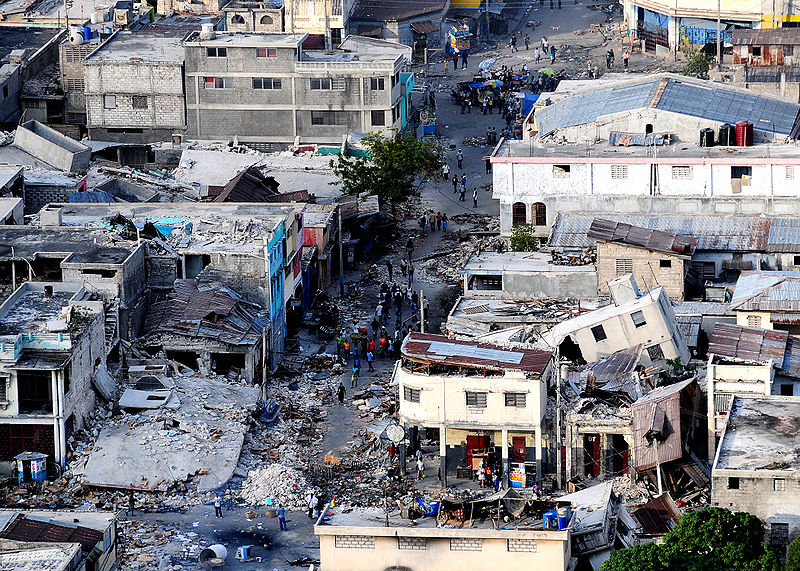What Next in Haiti? Strengthening the Grassroots
It’s often been said that tragedy hits those least equipped to handle it. The January 12th earthquake in Haiti is a strikingly sorrowful example. In the two weeks since then, the outpouring of assistance has been nothing short of stunning.
But as the humanitarian crisis starts to seem less urgent with the passage of time and emotional distance, longer-term concerns are being raised, including how to rebuild a society weakened by political turmoil, economic hardship, and social disintegration. This is a necessary and hopeful step in the right direction.
History tells us that when the scenes of destruction and human suffering stop flashing across our screens, the urgency and drive to help make a difference wane with them. This post-adrenalin lull has contributed to the repetition of painful cycles of tragedy, leaving societies no better equipped to handle them than before.
How many ‘crises’ has Haiti already had to endure? The consequences are cumulative, and with each passing calamity and absence of a sustainable solution, more difficult to address and resolve.
The Firelight Foundation does not work in Haiti, but we know that there are community-based organizations there like the ones we support in Africa doing heroic and usually unsung work. We are in the process of deciding on the recipient of a grant that would support grassroots action in the aftermath of the earthquake.
Our experience working with community-based organizations in Sub-Saharan Africa has shown us that when you’ve been hit with affliction upon affliction and few solutions are forthcoming, you can count on the community and extended family that surrounds you.
Firelight supports grassroots organizations working with communities and families precisely because we think they’re the surest and most sustainable way to improve the lives of vulnerable children dealing with issues ranging from disease and poverty to abuse.
For this reason, we’re heartened to hear others calling for a concerted international effort to help rebuild the weakened grassroots in Haiti because we, along with others, think it’s the surest bet for a brighter future for Haitians:
1. In commentary posted to The New York Times ‘Room for Debate’ blog (“The Help That Haiti Needs”), J. Michael Dash, author of Haiti and the United States, was among the first to call for more assistance to be directed at the grassroots in Haiti:
"Recovery and rebuilding must however be ultimately directed at the elements of civil society that had first appeared with the anti-Duvalier opposition and gave a voice to Haiti’s silent majority. In recent years the emphasis on economic privatization and foreign investment has shifted the emphasis from community-based organizations often seen as inimical to U.S. interests. In the absence of a strong Haitian state, the citizen action groups for social change need to be central to any transformation of Haitian society."
2. In a more recent Huffington Post piece, Ruth Messinger, head of American Jewish World Service—an organization that has been supporting grassroots organizations in Haiti for more than a decade—explained the importance of involving the very people hit by disaster in forging a solution:
"…this disaster will take years to fix. There is much to do for so many people, but to be successful the work must include support for the people of Haiti who have their own visions for their own future….
History has shown that large-scale relief operations don't always reach the people who are most in need. There are often gaps in rebuilding economic capacity and in long-term planning for sustainable solutions that are critical to a country's revival. And what my Haitian friends and mentors have taught me is that without these solutions real change is absolutely impossible. Furthermore, we must listen to local voices, include them in all planning and empower them to lead in implementation. They have unique knowledge of local culture and politics and the specific needs of each community. Without their participation, our efforts will fail."
3. In a January 22nd New York Times op-ed, Mark Danner, author of Stripping Bare the Body detailing the political turmoil in Haiti, the Balkans, and Iraq, argues for ensuring that aid money flows into the hands of ordinary Haitians:
"The world’s greatest gift would be to make it possible, and necessary, for Haitians—all Haitians—to rebuild Haiti."
So what now?
- Funders, NGOs, governments, and multilaterals working in Haiti should make sure that their relief and rebuilding efforts include grassroots organizations. Local community organizations add efficiency and accountability by making sure that relief targets the most vulnerable. They also keep an eye on the use of valuable resources and materials, and develop community-based programs and services that can fill in for absent government services while the government rebuilds itself.
- For those organizations and individuals working in Haiti who don’t have much experience with grassroots mobilization and strengthening work: please reach out to groups like Firelight. Although our size and Africa focus prevent us from getting directly involved, we’re ready to share our experiences and the lessons we’ve learned from supporting the grassroots in Sub-Saharan Africa for more than a decade.
Ten years later, we’re no less amazed by the resilience and resourcefulness of the community-based organizations that make such a huge difference in the lives of the most vulnerable—day in and day out.
And we would want nothing less for Haiti: a stronger grassroots for a brighter tomorrow.

